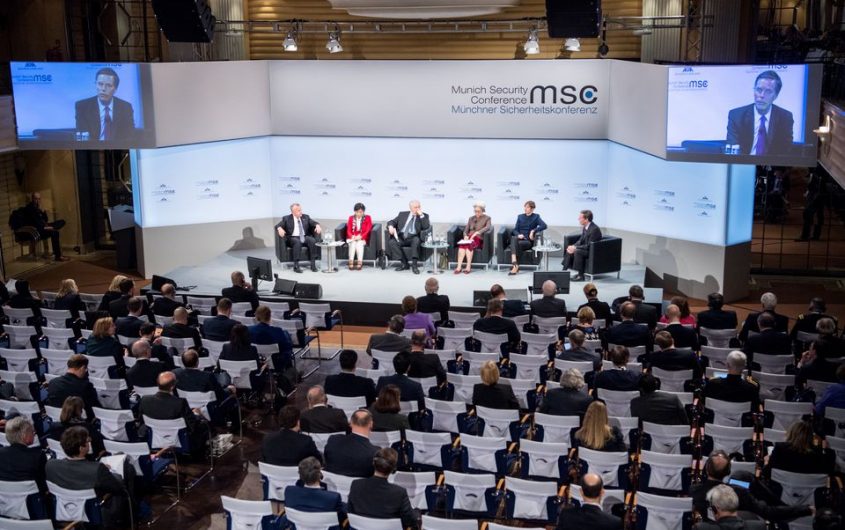
MSC / Mueller
The Munich Security Conference and the Transatlantic Partnership

James D. Bindenagel
University of Bonn
James D. Bindenagel is a retired U.S. Ambassador, Henry-Kissinger-Professor (Emeritus) at Bonn University, and Senior Non-Resident Transatlantic Fellow at the German Marshall Fund of the United States. He has published: Germany: From Peace to Power? Can Germany Lead in Europe without Dominating it? (2020) and International Sicherheit im 21. Jahrhundert, Deutschlands Verantwortung (2015), both published by V&R Bonn for Bonn University.
At the 2018 Munich Security Conference, Ambassador Wolfgang Ischinger awarded Senator John McCain the Ewald von Kleist Award for his services to transatlantic relations and to the Munich Security Conference. In his tribute to Senator McCain, former US Vice President Biden praised the senator’s contributions to America’s leadership in making the world stronger and Europe better.
McCain in a prepared statement put it simply: “We come to Munich because sustaining our vision of world order, though it requires wealth and power and realism, is not merely a material struggle. It is a moral struggle. It is about the values that will govern our world. That is why we are allies. That is why we have stood by each other, and sacrificed for each other, and invested in our common defense—and why we must continue to do so. (…) I am counting on you to keep the faith, and never give up—though the true radiance of our world may at times seem obscured, though we will suffer adversity and setbacks and misfortune—never, ever stop fighting for all that is good, and just, and decent about our world, and each other.“
However, the transatlantic partnership is facing its greatest challenge in U.S. policy that questions the American guarantee for European security. Matthew Karnitschnig, writing in Politico, took issue with the continuation of the decades-long use of the “Munich Security Conference to underscore their everlasting commitment to joint security. Trump’s repeated criticism of European defense spending as too modest, coupled with what many Europeans consider a belligerent U.S. foreign policy has fueled a deepening estrangement. […] Though Europe remains dependent on the North Atlantic Treaty Organization — and by extension the U.S. — for security, persistent tensions with Washington have convinced many European officials that they need to prepare for a future security infrastructure without Washington.“
Indeed, the Trump National Security Strategy presented in December last year lists four vital national interests, without an emphasis on common values. Before the release of the new National Security Strategy, U.S. National Security Advisor H.R. McMaster and the president’s economic advisor Gary D. Cohn already expressed in the Wall Street Journal the ‘America First’ strategy that has called long-lasting core values of American foreign policy into question. They stated „[…] the world is not a “global community” but an arena where nations, nongovernmental actors, and businesses engage and compete for advantage.” Supporters have asserted that the ‘Trump Doctrine’ sees this world for what it really is, not what we think it should be. But does it?
Gideon Rose, writing in this month’s Foreign Affairs reflects the concern with the new strategy when he stated “If you squint, U.S. foreign policy during the Trump era can seem almost normal. But the closer you look, the more you see it being hollowed out, with the forms and structures still in place, but the substance and purpose draining away.” In Mr. Trump’s view, we live in a world governed by the material correlation of forces, which he believes the U.S. needs to adjust in its direction by exerting military and economic power. In this new era, Hudson Foundation historian Herman argues, might makes right.
Hence, Europe, America’s closest ally of the last 70 years, is facing multifaceted challenges and has to adapt to a changing international power structure. These ‘America First’ views question Trump’s commitment to Europe and raise doubts over Trump’s foreign policy. Simply stated: Does the new foreign policy spur Europeans to reassert their values and to accept the burden of responsibility for their own security?
In Munich, German Defense Minister Ursula von der Leyen has provided a first answer. Her comments at the Munich Security Conference, which were echoed by French Defense Minister Florence Parly, came amid a deepening rift in the transatlantic alliance between the United States and Europe that helped underpin the post-World War II global order. She gave one of the most forceful recent European rejoinders to Trump’s global spending priorities. “In the 13 months since Trump took office, Europe has moved to boost defense spending, but also to improve its ability to fight alone without the support of the United States, if need be.“
Germany, whether it wants the leadership job or not, is the best hope to defend the liberal international order. Will Germany and Europe fill the leadership gap left by absent American leadership?









